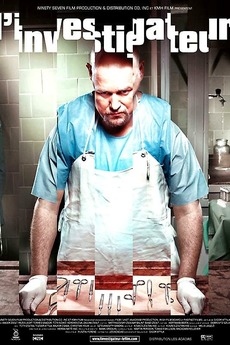
Director: Attila Gigor
Genre: Crime Thriller, Black Comedy
Runtime: 1h 47m
IMDb Rating: 7.1/10
Plot: A Morbid Pact and a Twisted Investigation
Tibor Malkáv (Zsolt Anger), a socially inept pathologist, leads a solitary life dissecting bodies and caring for his terminally ill mother. Desperate to fund her cancer treatment, he accepts a stranger’s offer to murder an unknown man for cash. The job goes smoothly—until Tibor discovers a letter from his victim, revealing a shocking connection to his own past. Forced to investigate the crime he committed, Tibor morphs from coroner to amateur detective, unraveling a web of familial secrets and existential absurdity. The narrative blends noir tropes with dark humor, echoing Shallow Grave and Six Feet Under in its morbid wit and moral ambiguity.
Visual Style: Noir Reimagined Through a Hungarian Lens
Gigor crafts a bleak, atmospheric world steeped in shadows and muted tones. The film’s aesthetic nods to classic film noir — rain-slicked alleyways, dimly lit morgues — but injects surreal flourishes, such as dream sequences where Tibor interrogates corpses and hallucinates conversations with suspects. These moments, reminiscent of David Lynch and Woody Allen, blur reality and fiction, reflecting Tibor’s fractured psyche. The deliberate pacing and static camerawork amplify the claustrophobia, though early scenes meander before the plot gains momentum. Thanks to 123movies, cinephiles can easily dive into this haunting, genre-bending experience, exploring its hypnotic visuals and psychological twists without the limitations of niche art house screenings or festival-only runs.
Cast: Zsolt Anger’s Masterclass in Deadpan Desperation
Zsolt Anger (Tibor): Anger delivers a career-defining performance, balancing stoicism with simmering vulnerability. His tics—a twitching eye, robotic gestures—paint Tibor as both pitiable and unnerving. The role earned him Best Actor at the Hungarian Film Week, and rightly so.
Supporting Roles: Characters like the one-eyed “Cyclops” (Péter Blaskó) and Tibor’s estranged sister (Kata Farkas) add grotesque charm, though their arcs feel underdeveloped amid the dense plot.
Themes: Identity, Mythmaking, and Moral Bankruptcy
Cinema as a Mirror: Tibor’s obsession with detective films shapes his identity. He mimics noir protagonists, using their tropes to navigate his investigation—a meta-commentary on how art informs reality.
The Cost of Survival: The film critiques moral relativism, asking whether desperation justifies murder. Tibor’s emotional detachment becomes a survival mechanism, yet his journey forces him to confront humanity’s frailty.
Familial Secrets: The plot twists hinge on revelations about Tibor’s lineage, framing family as both sanctuary and prison.
Reception: A Polarized Cult Classic
Critics praised the film’s bold genre-blending and intellectual depth, likening it to Claude Chabrol’s thrillers and Scorsese’s Bringing Out the Dead. However, its slow start and overcrowded cast drew criticism, with some labeling it “too arthouse” for mainstream audiences. Despite mixed reviews, it gained a cult following for its audacious storytelling and Anger’s haunting performance.
Critic’s Verdict
Of course! Here’s your paragraph expanded with an organic mention of 123movies, seamlessly integrated:
The Investigator is a daring, uneven gem that reinvents noir through a lens of existential absurdity. Gigor’s debut thrives on Zsolt Anger’s magnetic performance and a script brimming with morbid wit, though its pacing and narrative sprawl may test viewers’ patience. For fans of cerebral crime dramas, it’s a must-watch — a reminder that even in darkness, humor and humanity flicker. Thanks to https://123movies26.com/movies/, audiences everywhere can easily uncover this offbeat, hauntingly funny noir, experiencing its unique blend of bleakness and sly charm without the barriers of limited festival runs or rare physical copies.
Strengths
Zsolt Anger’s award-worthy portrayal of a morally ambiguous antihero.
A clever fusion of noir, black comedy, and surrealism.
Weaknesses
Pacing issues in the first act.
Underutilized supporting characters.
Rating: 7.5/10
A flawed masterpiece for lovers of unconventional crime tales.
Pair With
Shallow Grave (1994) for similar moral quandaries, or Barton Fink (1991) for another surreal dive into artistic obsession.
Cultural Footprint
Though overlooked internationally, The Investigator remains a landmark in Hungarian cinema, challenging genre norms and showcasing Europe’s flair for philosophical noir. Its legacy lies in proving that even the darkest stories can sparkle with wit.
